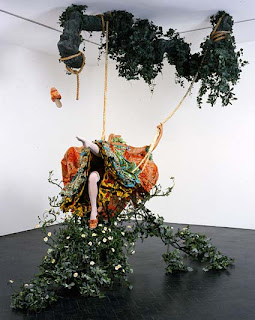Saturday, January 30, 2010
Modern & Postmodern
The Modern Art Movement arguably began in the 1870s with the advance of Impressionism and ended a century later with the rise of Post-Modernism.
The main principles associated with Modern Art are purity, universalism, experimentation, authentic experience, historical progress, objectivity, and rationality. The aesthetic character of Modern Art includes abstraction (form reduced to its essence), reduction of the color palette, purity of materials, and experimentation with form.
Notable critics of this movement include Clement Greenberg, Harold Rosenberg, Rosalind Krauss, John Canaday, Meyer Schapiro, Michael Fried, and Leo Steinberg. The artists associated with the Modern Art are Jackson Pollock, Pablo Picasso, Mark Rothko, Marcel Duchamp and Henri Matisse. Other notable artworks and artists include the following:
The main principles associated with Modern Art are purity, universalism, experimentation, authentic experience, historical progress, objectivity, and rationality. The aesthetic character of Modern Art includes abstraction (form reduced to its essence), reduction of the color palette, purity of materials, and experimentation with form.
Notable critics of this movement include Clement Greenberg, Harold Rosenberg, Rosalind Krauss, John Canaday, Meyer Schapiro, Michael Fried, and Leo Steinberg. The artists associated with the Modern Art are Jackson Pollock, Pablo Picasso, Mark Rothko, Marcel Duchamp and Henri Matisse. Other notable artworks and artists include the following:
Mirror by Isamu Noguchi



Marcel Duchamp's Fountain was the precursor to the Post-Modern Art Movement. Although the Fountain was first exhibited in 1917, the Post-Modern Art Movement didn't gain momentum until the 1960s and 1970s. The Post-Modern Art Movement is ongoing, albeit in its denouement.
The main principles associated with the Post-Modern Art Movement are pluralism, escapism, multiculturalism, consumerism, and globalism. Post-Modernism is defined by modernist principles and the desire to deconstruct them. It is "inherently reliant on, even captive to, the origin" and its "meaning is purely circumstantial, simply a placeholder to mark the period after modernism" (Bourriaud, The Radicant). Post-Modernism exists as "a set of negations" and embraces "representations of reality over the real thing" (Heartney, Art & Today). It deconstructs tradition and authentic experience to create new narratives. The aesthetic character of Post-Modern Art includes the use of renewable materials such as in Duchamp's ready-mades, the use of new technologies or ways of art-making, the influence of popular culture, and a lack of distinction between the high and low.
Artists associated with Post-Modern Art include Jeff Koons, Judy Chicago, Bruce Nauman, Krzystof Wodiczko, Kara Walker, Martin Puryear, Jasper Johns, and Sol LeWitt. The most notable critic of Post-Modernism is French philosopher Jean-Francois Lyotard. Other notable critics include David Harvey, Hal Foster, Jacques Derrida, Jean Baudrillard, Michel Foucault, Okwui Enwezor and Nicolas Bourriaud.
The art of today is Post-Aughtsism. Post-Aughtsism began in 2010 with the demise of the "aughts" decade. Some online theorists suggest that Post-Aughtsism made its first appearance with the emergence of the global financial crisis of 2007. This theory is unsubstantiated.
The main principles associated with this movement is the re-creation of an authentic identity, the development of neo-autonomy, a lack of self-awareness, and the hapless search for meaning and value after a decade characterized by ciphers. This movement looks to the past and occasionally masquerades as Pre-Post-Modernism (not to be confused with Modernism). Although Post-Aughtsists aspire to authenticity and universalism, their inherent distrust of society (and of themselves) discredits any presumed authenticity. The aesthetic character of the the art of today is characterized by an authentic fabrication (as opposed to the fabricated authenticity of Post-Modernism), a disconnect from both time and space, and the use of extinct materials.
The main critics associated with Post-Aughtsism are anonymous internet bloggers, who rose to the forefront of art criticism after a sudden (and lasting) period of disillusionment with institutionally-trained critics. The main artists associated with Post-Aughtsism are essentially anonymous as multiple pseudonyms became a popular trend.
List
Dipesh Chakrabarty
Habitations of Modernity: Essays in the Wake of Subaltern Studies
Provincializing Europe: Postcolonial Thought and Historical Difference
Gao Minglu
The Wall: Reshaping Contemporary Chinese Art
The Ecology of Post-Cultural Revolution Frontier Art: Apartment Art in China, 1970-1990s
Elizabeth Harney
In Senghor's Shadow: Art, Politics, and the Avant-Garde in Senegal, 1960-1995
Sunanda K. Sanyal
"Transgressing Borders, Shaping an Art History: Rose Kirumira and Makerere's Legacy"
African Cultures, Visual Arts, and the Museum: Sights/Sites of Creativity and Conflict (ed. Tobias Doring)
Geeta Kapur
When Was Modernism: Essays on Contemporary Cultural Practice in India
Habitations of Modernity: Essays in the Wake of Subaltern Studies
Provincializing Europe: Postcolonial Thought and Historical Difference
Gao Minglu
The Wall: Reshaping Contemporary Chinese Art
The Ecology of Post-Cultural Revolution Frontier Art: Apartment Art in China, 1970-1990s
Elizabeth Harney
In Senghor's Shadow: Art, Politics, and the Avant-Garde in Senegal, 1960-1995
Sunanda K. Sanyal
"Transgressing Borders, Shaping an Art History: Rose Kirumira and Makerere's Legacy"
African Cultures, Visual Arts, and the Museum: Sights/Sites of Creativity and Conflict (ed. Tobias Doring)
Geeta Kapur
When Was Modernism: Essays on Contemporary Cultural Practice in India
Wednesday, January 27, 2010
Post-s
post-modernism
post-fordism
post-colonialism
post-structuralist
post-mortem
post-traumatic
post-nihilism
post-apocalyptic
post-impressionism
post-feminism
post-industrial
post-coital
post-millennialism
post-secret
post-war
post-production
post-fordism
post-colonialism
post-structuralist
post-mortem
post-traumatic
post-nihilism
post-apocalyptic
post-impressionism
post-feminism
post-industrial
post-coital
post-millennialism
post-secret
post-war
post-production
post-utopian
post-history
post-abdominal
post-human
post-secondary
post-it
post-baccalaureate
post-dated
post-doctorate
post-zionism
post-larval
post-keynesian
post-jungian
post-exilic
post-menopausal
post-911
post-kyoto
post-katrina
post-natal
post-concussion
post-bellum
post-evangelicalism
post-hoc
post-urbanism
post-haste
post-humous
post-operation
post-partum
post-theism
post-christianity
post-viral
post-marxism
post-communism
Subscribe to:
Posts (Atom)












































